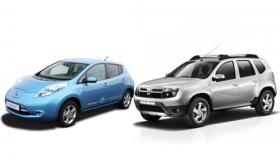

Great news! The Alliance has two cars, the Nissan Leaf and Dacia Duster, on the shortlist for the 2011 European Car of the Year award.
The shortlist of seven cars has been narrowed down from an initial field of 41 cars and the winner will be announced on November 29.
There are 58 members of the COTY jury, representing 23 countries with France, Germany, Italy, Spain and the UK each having six members and other countries proportionally fewer. They selected the shortlist and their task now is to choose their favourites. Each jury member has to allocate a total of 25 points among at least five of the seven shortlisted cars with no more than 10 points for their No 1 choice.
The judges note that Dacia has been the European champion of low cost for some time, with a growing acceptance of its products outside Romania because of the good value. “The Renault subsidiary does it again with the Duster, the most affordable SUV in the market … the new 5-door body sits on the usual, rugged Logan platform, with a raised ground clearance.”
The Leaf gets on the shortlist with the jurors noting that “Nissan and Renault have made a big bet on electric cars. The undeniable social convenience of this alternative has more backing from political promises than from potential customers in the short term. Cars like the Leaf might operate a change in public opinion … this pioneer is a practical proposition from the point of view of usability and performance.”
While COTY members were among the first media to experience the Nissan Leaf, we are also beginning to get some very positive feedback from the more recent launch in Lisbon, Portugal, for a much wider media audience.
And with two vehicles in the final seven, the odds must be in our favour for one of them making the top three on November 29.
The other finalists are Alfa Romeo Giulietta, Citroën C3/DS3, Ford C-Max/Grand C-Max, Opel/Vauxhall Meriva and Volvo S60/V60.
In selecting the Car of the Year, jurors use the following criteria: design, comfort, safety, economy, handling, performance, functionality, environmental requirements, driver satisfaction, and price. Technical innovation and value for money are particularly important factors.
Eligible cars must be available in at least five European countries at the time of voting and have an expected sales volume of 5,000 a year.
print Tweet